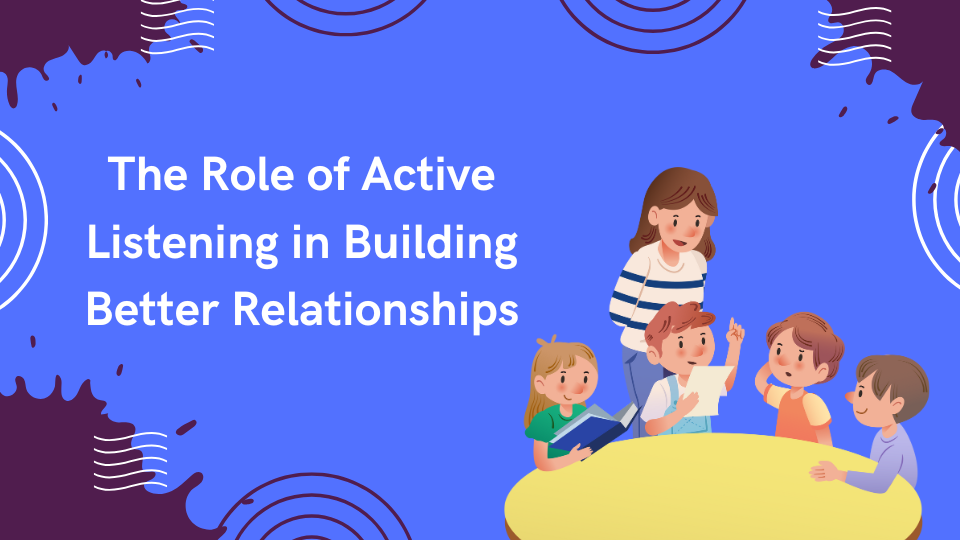The Role of Active Listening in Building Better Relationships. In a time when instant messaging and social media dominate our interactions, the nuances of face-to-face conversation often get overlooked. Nonetheless, strong relationships—whether they are personal friendships or professional collaborations—are built on effective communication. A critical component of this communication is the art of active listening. This article delves into how active listening enhances relationship-building, promotes understanding, and fosters a sense of community among individuals.
Defining Active Listening
Essential components of active listening include:
- Concentration: Eliminating distractions—such as smartphones or background noise—ensures that the listener is completely focused on the speaker. Maintaining eye contact and employing positive body language can further reinforce this attentiveness.
- Empathetic Response: Understanding the emotional layers of a conversation is vital. Empathy enables listeners to appreciate the speaker’s feelings and perspectives, fostering a deeper connection.
- Clarifying Questions: Active listeners often pose questions to clarify or delve deeper into the speaker’s thoughts, signaling genuine interest and helping prevent miscommunication.
- Reflective Listening: Summarizing what the speaker has conveyed or reflecting on their emotional state demonstrates understanding and assures the speaker that their message has been received.
Trust Building Through Listening
Trust forms the foundation of any successful relationship. When individuals feel that their thoughts and feelings are genuinely acknowledged, trust naturally develops. Active listening cultivates this trust by providing a safe environment for open communication. In personal relationships, when partners actively listen to each other, they demonstrate that their feelings matter, which can mitigate misunderstandings.
In professional contexts, trust established through active listening enhances collaboration among team members. When colleagues are comfortable expressing their views and concerns, they are more likely to engage creatively and constructively. This supportive environment not only fosters teamwork but also contributes to a positive workplace culture.
Navigating Conflict with Understanding
Misunderstandings often lead to conflict. By practicing active listening, individuals can effectively navigate disagreements, gaining insight into the emotions and motivations behind differing opinions. When both parties engage in active listening, they are more likely to uncover common interests and reach a mutual understanding.
For example, in a professional setting, two colleagues may clash over a project’s direction. Instead of immediately defending their position, each can employ active listening to better understand the other’s perspective. This collaborative approach can transform conflict into an opportunity for creative problem-solving.
In personal relationships, active listening can defuse tensions. Couples who engage in active listening are better equipped to discuss sensitive topics, and this understanding can strengthen their emotional bond over time.
Developing Empathy and Emotional Awareness
Active listening is a powerful tool for enhancing empathy—an essential component of healthy relationships. When individuals commit to active listening, they become more attuned to the emotions and needs of those around them. This heightened emotional awareness enriches interactions and enables more compassionate and thoughtful responses.
For instance, when a friend shares their challenges, active listening allows the listener to validate their feelings without jumping to provide solutions. This kind of support deepens the connection between friends, making it easier to navigate life’s challenges together.
The Community Impact of Active Listening
The advantages of active listening extend beyond individual relationships and influence larger communities. In educational settings, teachers who engage in active listening create inclusive environments where students feel valued and empowered. When students know their voices are heard, they are more likely to participate actively, which enhances their overall learning experience.
In corporate environments, leaders who practice active listening foster trust and respect within their teams. This leadership style encourages open communication and innovation, creating a culture where employees feel inspired to share ideas and feedback. The result is a collaborative atmosphere that boosts morale, productivity, and job satisfaction.
Enhancing Active Listening Skills
Improving active listening skills can profoundly impact both personal and professional relationships. Here are some practical strategies to enhance this vital skill:
- Mindfulness Practices: Being present in the moment is essential for effective listening. Mindfulness techniques, such as deep breathing or meditation, can sharpen focus and attention.
- Minimize Distractions: Turn off notifications and remove other distractions during conversations. This allows for a more meaningful exchange of ideas.
- Summarize and Reflect: Regularly summarizing what the speaker has said can reinforce understanding and demonstrate active engagement.
- Encourage Feedback: Ask the speaker for feedback on how well the listener understood their message. This practice helps refine listening skills and builds rapport.
- Reflect on Emotions: Take time to consider the emotional impacts of conversations on both parties. Reflecting on these feelings can deepen empathy and understanding.
Active listening is an essential skill that significantly contributes to building stronger relationships. By nurturing trust, enhancing understanding, and fostering empathy, active listening lays the groundwork for meaningful interactions. In both personal and professional contexts, prioritizing active listening can transform communication and strengthen connections.
As we navigate a world filled with fleeting interactions, let us commit to embracing the power of active listening. By fully engaging with one another, we not only enhance our relationships but also contribute to a more compassionate and understanding community.

